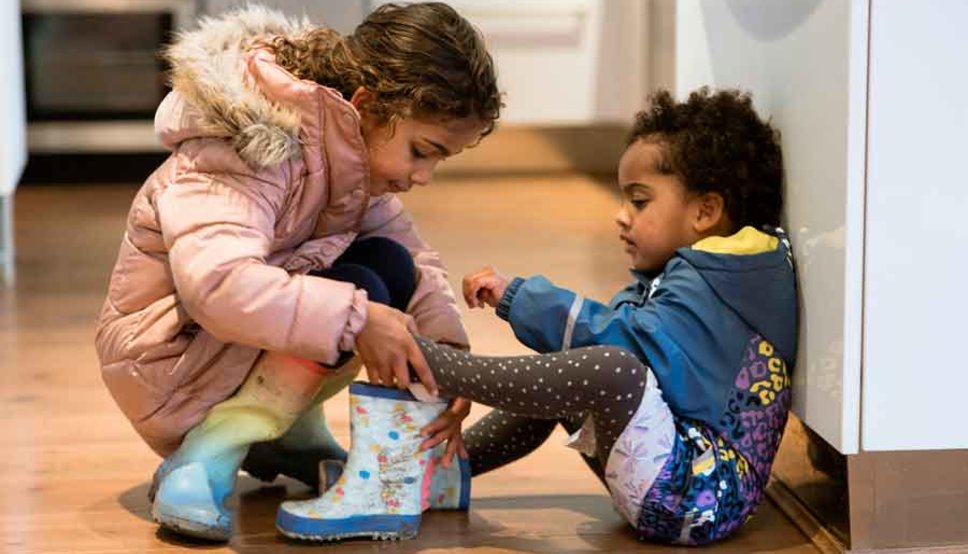What It Means to be a Good Citizen and How to Teach Children

Being a good citizen is a concept with no true definition. If you ask individuals what being a good citizen means to them, it will undoubtedly result in a variety of responses. Answers may range from the simple “being a good person” to entire lists of civic duties.
Margaret Paccione-Dyszlewski, PhD, is the director of clinical innovation at Bradley Hospital. Dr. Paccione said, “Being a productive and model citizen takes kindness, compassion, and empathy toward others. Sometimes this requires extra tolerance especially of people whose beliefs and attitudes are different from ours. This extra effort is usually appreciated by the other person and helps us learn more about those who are different from us.”
Living in America today can be a bit challenging. A difficult economy and a pandemic, combined with climate change, civic issues, and political unrest have led us to an unsettling time in our history. But it may also be the perfect opportunity for parents to talk with their children about what it means to be a good citizen.
Being a good citizen
Before we can help our children understand their role as a member of a community, it helps to first define it. What does it mean when we say someone is a good citizen?
First, there are established rules we must follow. We all need to abide by laws, pay our taxes, and vote. Beyond that, other traits associated with being a good citizen include:
- having respect for others and their property
- knowing your rights and respecting the rights of others
- being informed on the issues of the day
- learning the facts of our true history, both good and bad
- having compassion and empathy for others
- taking responsibility for your own actions
- being tolerant and accepting of others’ beliefs and attitudes
- recognizing and respecting the truth and speaking truth to power
Teaching kids to be good citizens
Once you understand what being a good citizen means to you and your family, it’s time to talk to your children about it. Having an open, honest conversation is what children need to better understand the concept. Explain to your child what you’re hoping to do and why, then encourage them to ask questions and provide honest answers as best you can.
- Be a role model. You are the biggest influence on your child. Be sure that you are modeling the behaviors you would like to see in your child.
- Discuss the issues. Don’t be afraid to talk about the issues of the day. Have frank discussions on the political divide, current events, and social issues. It’s only through open discussion that issues can be brought to light and addressed.
- Be a responsible voter. Do your research, talk about the candidates and their views, and why you are voting for one candidate and not another. Take your child to vote with you and explain the process. This will help to convey your beliefs and views on topics that are important to you and your family. Explain how our government works and why it is important to our society. Children can learn much more on this topic here.
- Get involved. Support your local community by taking part in community activities and volunteering for events. Having your child be part of this can help instill a lifelong tradition of being involved and offer a sense of belonging.
You can learn more about how to effectively talk to kids in this post.
Remembering the fine art of conversation, without argument
Conversation is key. Once upon a time, conversation was an art. Today, so many of our conversations devolve into arguments, with neither side winning. The art of listening respectfully and responding accordingly seems to have disappeared.
That’s why it’s important to instill in kids the value of a true conversation. It’s critical that we remind children (and adults!) that opposing viewpoints are something to be discussed, not dismissed. It’s time for all of us to recognize that it’s okay for others to think differently about things and have their own opinions.
Part of being a good citizen is recognizing that not everyone will agree and to respect the opinions of others, even when they differ from our own. The key, though, is whether those opinions are based on fact. The truth is what is most important in a conversation.
Being a good citizen in the digital world
It’s one thing to be a good citizen in the real world. But today, reality also includes the digital world. Social media has had a huge impact on society, affecting how people obtain their information, share their thoughts, and treat others. Unfortunately, not all of it is good.
Teaching children to be a good citizen in the digital world is also crucial. Again, having open discussions and stressing the importance of respect and truth in the digital sphere can be helpful for children. You can learn more here and here.
Learn more about getting kids to think about what it means to be a good citizen in this NPR report. For more tips on raising happy, healthy kids, visit the Grow section of the Be Well health and wellness blog.
About the Author:
Brown University Health Blog Team
The Brown University Health Blog Team is working to provide you with timely and pertinent information that will help keep you and your family happy and healthy.
Find a Doctor

The right provider is in our network
Search more than 1,200 providers in our network.
